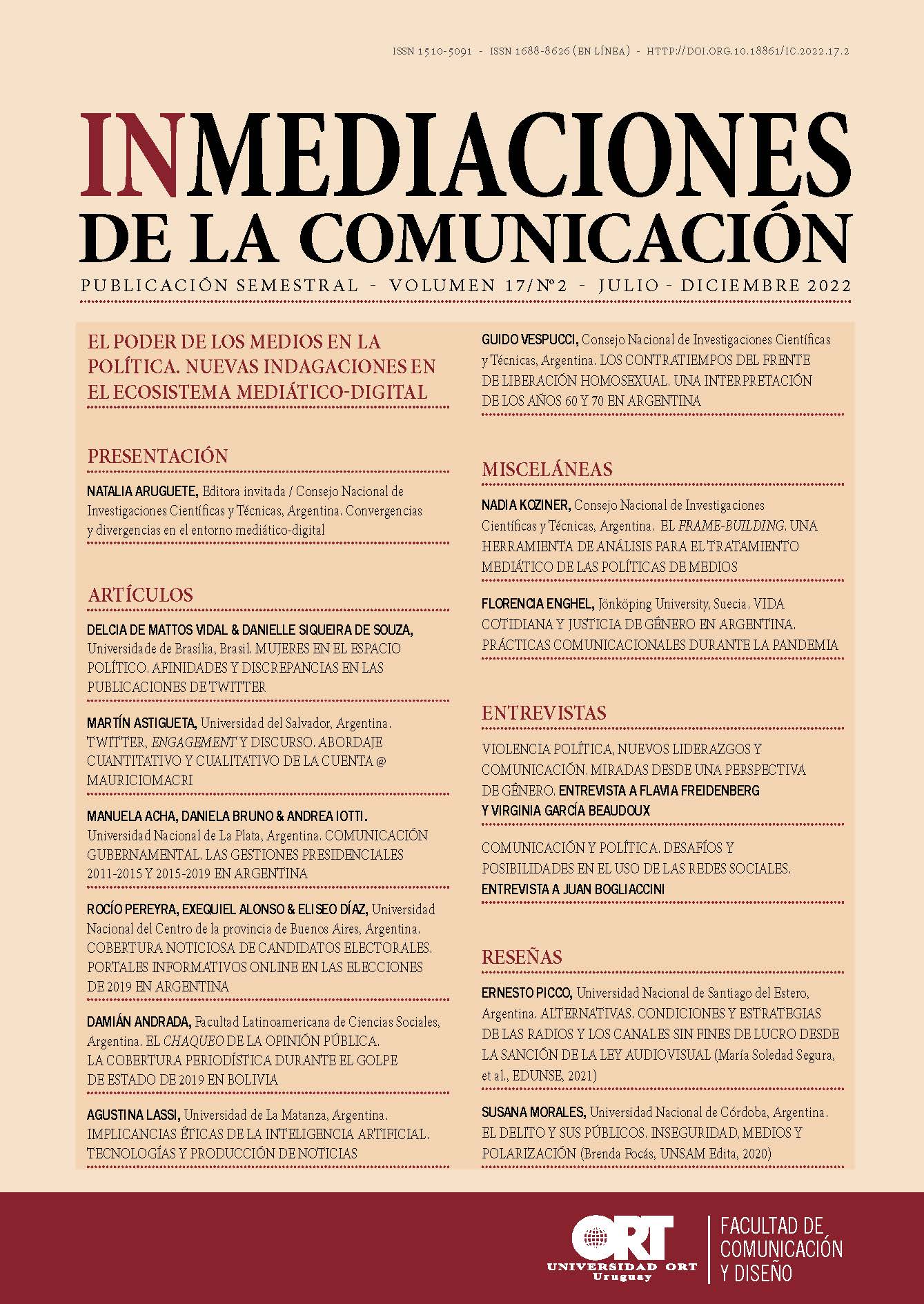Ethical implications of artificial intelligence
Technologies and news production
DOI:
https://doi.org/10.18861/ic.2022.17.2.3334Keywords:
artificial intelligence, journalism, newsrooms, ethicsAbstract
This article makes a bibliographical approach about the ethical challenges posed by the application of artificial intelligence (AI) in the field of journalistic newsrooms. For this purpose, the report on news automation by the World Association of News Publishers –which represents more than 120 countries and is known as WAN-IFRA– and the guide linked to algorithmic data processing in newsrooms published by the news agency The Associated Press (AP), whose particularity lies in the assistance for the writing of various AI, in addition to being a pioneer in the application of these systems to content production, are reviewed. The main ethical dilemmas are identified and the challenges and difficulties faced by the journalist when using machine processing for the production, processing and distribution of newsworthy products are addressed. The main hypothesis with which it works is that there are still no documents that consider the potentialities and consequences of the application of these technologies in a responsible manner according to the ethical standards of journalism. It is understood that this is an area of relative vacancy in Spanish speaking and of growing relevance, so the article seeks to provide new reflections on the ethical implications that are highlighted in the aforementioned documents and to think about the future challenges of practice in newsrooms from a growing use of AI.
Downloads
References
Anderson, C. W., Bell, E. & Shirky, C. (2014). Post Industrial Journalism: Adapting to the Present. New York: Columbia University Libraries.
Beckett, C. (November 18, 2019). New Powers, New Responsibilities: A Global Survey of Journalism and Artificial Intelligence. Recuperado de: https://blogs.lse.ac.uk/polis/2019/11/18/new-powers-new-responsibilities/
Carlson, M. (2015). The Robotic Reporter: Automated journalism and the redefinition of labor, compositional forms, and journalistic authority. Digital Journalism, 3(3), 416-431. DOI: https://doi.org/10.1080/21670811.2014.976412
Diakopoulos, N. (2015). Algorithmic Accountability: Journalistic investigation of computational power structures. Digital Journalism, 3(3), 398-415. DOI: https://doi.org/10.1080/21670811.2014.976411
Diakopoulos, N. (2019). Automating the News How Algorithms Are Rewriting the Media. Cambridge: Harvard University Press.
Donsbach, W. (2014). Cómo entender al periodismo. Selección de la obra de Wolfgang Donsbach. Berlín: Konrad Adenauer Stiftung - Minigraf.
Dörr, K. (2016). Algorithmen, big data und ihre Rolle im computational journalism. In Meier, K. & Neuberger, C. (Eds.), Journalismusforschung. Stand und Perspektiven (pp. 245-262). Baden-Baden: Nomos.
Dörr, K. N. & Hollnbuchner, K. (2017). Ethical challenges of algorithmic journalism. Digital journalism, 5(4), 404-419.
Fanta, A. H. (2017). Putting Europe’s Robots on the Map: Automated journalism in news agencies. Reuters Institute Fellowship Paper, 1-24. Recuperado de: https://reutersinstitute.politics.ox.ac.uk/sites/default/files/2017-09/Fanta%2C%20Putting%20Europe%E2%80%99s%20Robots%20on%20the%20Map.pdf
Fırat, F. (2019). Robot journalism. The International Encyclopedia of Journalism Studies, 1-5.
Glahn, H. (1970). Computer worded forecasts. Bulletin of the American Meteorological Society, 51(12), 1126-1132.
Graefe, A. (2016). Guide to Automated Journalism. Columbia University Libraries. DOI: https://doi.org/10.7916/D80G3XDJ
Lindén, C. G. & Tuulonen, H. (editors). (2019). News Automation The rewards, risks and realities of “machine journalism”. Frankurt: WAN-IFRA.
Marconi, F. & Siegman, A. (2017). The Future of Augmented Journalism: A guide for newsrooms in the age of smart machines. New York: AP.
Meehan, J. (1977). TALE-SPIN, An interactive program that writes stories. International Joint Conferences on Artificial Intelligence, 77, 91-98. Recuperado de: https://www.cs.utah.edu/nlp/papers/talespin-ijcai77.pdf
Mittelstadt, B. D., Allo, P., Taddeo, M., Wachter, S. & Floridi, L. (2016). The ethics of algorithms: Mapping the debate. Big Data and Society, 3(2). DOI: https://doi.org/10.1177/2053951716679679
Montal, T. & Reich, Z. (2017). I, Robot. You, Journalist. Who is the Author?: Authorship, bylines and full disclosure in automated journalism. Digital Journalism, 5(7), 829-849. DOI: https://doi.org/10.1080/21670811.2016.1209083
Monti, M. (2018). Automated journalism and freedom of information: Ethical and juridical problems related to AI in the press field. OPINIO JURIS Studies in Comparative and National Law, 1. Recuperado de: https://www.researchgate.net/publication/330666843_Automated_Journalism_and_Freedom_of_Information_Ethical_and_Juridical_Problems_Related_to_AI_in_the_Press_Field
Perrault, R., Shoham, Y., Brynjolfsson, E., Clark, J., Etchemendy, J., Grosz, B., Lyons, T., Manyika, J., Mishra, S. & Niebles, J. C. (2019). Introducing the AI Index 2019 Report. Recuperado de: https://hai.stanford.edu/blog/introducing-ai-index-2019-report
Tsamados, A., Aggarwal, N., Cowls, J., Morley, J., Roberts, H., Taddeo, M. & Floridi, L. (2020). The Ethics of Algorithms: Key Problems and Solutions. SSRN Electronic Journal. DOI: https://doi.org/10.2139/ssrn.3662302
Túñez-Lopez, M., Toural-Bran, C. & Valdiviezo-Abad, C. (2019). Automatización, bots y algoritmos en la redacción de noticias. Impacto y calidad del periodismo artificial. Revista Latina de Comunicación Social, 74, pp. 1411-1433. DOI: https://doi.org/10.4185/RLCS-2019-1391
Tutt, A. (2017). An fda for algorithms. Administrative Law Review, 69(1), pp. 83-123. DOI: https://doi.org/10.2139/ssrn.2747994
Vállez, M., Codina, L. & Fabra, U. P. (2018). Periodismo computacional: evolución, casos y herramientas. Computational journalism: Evolution, cases and tools. El profesional de la información, 27(4), pp. 759-768. DOI: https://doi.org/10.3145/epi.2018.jul.05
van Otterlo, M. (2013). A Machine Learning View on Profiling. In M. Hildebrandt & K. de Vries (eds.), Privacy Due Process and the Computational Turn. The Philosophy of Law Meets the Philosophy of Technology (pp. 41-64). London: Routledge.
Reiter, E. & Dale, R. (1997). Building applied natural language generation systems. Natural Language Engineering, 3(1), 57-87.






